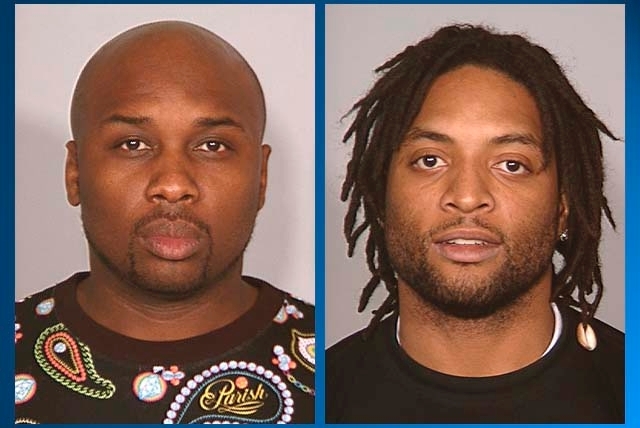Legislation aims to shut revolving door for pimps
Marc Schifalacqua, a Clark County prosecutor, has put plenty of pimps behind bars for pandering girls and women.
He’s the first to say that Las Vegas is one big revolving door for pimps who commonly receive light sentences even if they abuse prostitutes or pander minors.
He’s all in favor of Assembly Bill 67, which is making its way through the Nevada Legislature. It is zero-tolerance legislation that advocates hope will stop the revolving door.
A key element of the bill is a redefinition of prostitution as sex trafficking.
Sex trafficking within the United States is legally defined as commercial sex acts induced by force, fraud or coercion or commercial sex acts in which the individual induced to perform commercial sex has not attained 18 years of age.
AB67 would allow pimps to be sentenced to life in prison in cases where the children are younger than 14; and stick them with 20-year sentences in cases where adults are forced physically or by coercion into prostitution.
The intent of AB67 is to bring the Silver State in line with states that have adopted similar stiff sentences for sex trafficking. The movement started with Washington state in 2003. A dozen other states have followed suit.
Like most bills in the Legislature, AB67 has undergone significant amendment since its introduction in February.
At least one key provision has been eliminated: allowing victims to immediately testify against pimps after their arrest.
Prosecutors favored the change because it would take away time pimps use to threaten or cajole prostitutes out of testifying against them.
But critics of the bill said the change would take away a fundamental right of the accused to waive their preliminary hearing.
As amended, the bill would allow prostitutes to give written depositions.
Other provisions now under scrutiny include allowing prostitutes to sue sex traffickers for compensation, and labelling as sex traffickers anyone who transports a prostitute to and from work.
The bill’s attempt to define the act of prostitution itself is a subject of debate. In addition to describing a sexual act in return for money, the bill’s authors added: “... any intrusion however slight of any part of a person’s body.”
Allen Lichtenstein, legal counsel for the American Civil Liberties Union in Nevada, said he wonders where that one came from.
“I know a lot of dentists who could be charged as the way the law is written now,” said Lichtenstein, who is trying to help rewrite that part.
Another controversial section of AB67 takes away a potential defense. A pimp caught trafficking a minor could not argue that he did not know the prostitute was underage.
But what really concerns the ACLU is the way the law seems to give prostitutes the benefit of the doubt in alleging that a pimp used force, fraud or coercion to get them to turn tricks, and in allowing psychological manipulation as an element in determining guilt.
“The law, as it’s written, makes the assumption that nobody would possibly ever get into the line of work unless they were brainwashed or forced into it, or they were simply out of control and could not control their bodies,” Lichtenstein said.
“Sex trafficking and involuntary servitude are serious problems. On this we can all agree, but there needs to be some safeguards to create a balance so if some woman gets mad, she can’t just later on say, “Oh, I’ve been trafficked. He made me do it.’ ”
The cornerstone of the legislation is to go after the pimps who either threaten or use force, a clause that warms Robert Hoo’s heart.
He is the executive director of Nevadans for a Common Good, which has been promoting the bill in churches around Las Vegas.
“It’s time to address this issue,” said Hoo, a lawyer by trade. “It’s time to take away the stereotype of Sin City and replace it with a decent law that will make this city a better place to live in. It’s time to improve the quality of life. There are real people and real families who live and work here, and hopefully this bill is a start.”
Under current Nevada law, a pimp who prostitutes a minor can face a sentence of one to 10 years. If the pimp uses force, fraud or coercion, the sentence can be two to 20 years.
If the pimp traffics an adult, however the sentence can be one to four years; or one to five years if force or coercion is involved.
“The penalties are weak, frankly, for both a child and the adult,’’ Schifalacqua said. “They’re both on the low end, at least from where I work.”
As proof, Schifalacqua runs through a quick list of pimps who have done time at High Desert Prison north of Las Vegas and are now back on the street, guys like Dejon Booker, who did just 17 months of a 48-month sentence after his illegal brothel in The Lakes was busted in 2009.
Sentenced in May 2010, Booker was paroled in December 2011.
Booker was not accused of using force, but did set up dates and arranged to transport women to and from the Strip to meet customers, Schifalacqua said.
What really irks Schifalacqua was that Booker had been convicted, in November 2008, of pandering a 17-year-old girl at the Palms; but he only received probation in that case because it was his first offense.
“If that’s not a case of soft sentencing, I don’t know what is,’’ Schifalacqua said.
Then there’s Daniel Lee, 33, who attacked a 15-year-old Las Vegas high school girl when she tried to flee his business, Schifalacqua said.
In July 2009, Lee was convicted of pandering of a child, statutory sexual seduction, first-degree kidnapping and furnishing transportation.
The kidnapping charge was later overturned on appeal, but Lee was sentenced to two to five years in prison. He served just under three years before his release in 2011.
Under AB67, pimps such as Lee and Booker convicted of pandering a minor would get a mandatory minimum of 10 years in prison. Those who pander minors younger than 16 would face life in prison.
James Dold, 29, a native Las Vegan who now works for the Polaris Project in Washington, D.C., had a hand in drafting AB67 and similar legislation in other states.
The nonprofit Polaris Project bills itself as “a leading organization in the global fight against human trafficking and modern-day slavery.”
In its literature, the Polaris Project doesn’t condemn prostitution per se, but advocates heavy penalties for sex traffickers, or those who force anyone to engage in commercial sex or who induce minors into prostitution.
While not defending sex traffickers, critics of the sex-trafficking legislation say it violates civil rights while doing nothing to end the practice.
“This is not a game of politics where one person loses and another wins,” said Jenny Heineman, a University of Nevada, Las Vegas graduate student in sociology and self-identified sex worker. “These debates and subsequent policies affect real lives. They affect my life and the lives of my sisters and brothers.”
Heineman said some principles in AB67 are too broad, in both definition and in approach, especially with regard to children.
She points out that even minors sometimes need to prostitute themselves in order to survive, and that efforts to crack down on prostitution ignore the economic inequality that drove them to it.
Instead of ruling the act morally wrong and taking the approach of abstention, Heineman said it’s better to hit it head on and prevent the damage.
“This current moral panic surrounding sex trafficking, perpetuated by fundamentalist religious folks ... is clearly a way for white people to appropriate the legacy of victimization from slavery,” Heineman said. “They blanket their traditional and oppressive ideas about sex and gender in discourse. They say, ‘Save the children!’ But in the end they’re doing very little to save them.”
Contact reporter Tom Ragan at tragan@reviewjournal.com or 702-224-5512.




























